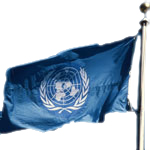
There is no question that Beijing has pursued a mercantilist strategy of conquering US and European markets by holding down the yuan/renminbi. It has a monthly trade surplus of $40bn, the highest ever recorded by any country. Or put another way, China is exporting its surplus capacity to the rest of the world. It has become a global deflation machine. Even so, Mr. Geithner is playing with fire. Beijing has amassed reserves of $1.9 trillion. From what we know, most of this money is held in the form of US Treasuries and other bonds. Creditors exercise power. Don't be fooled by claims that China could not deploy this weapon without damaging its own interests. All kinds of things can and do happen when tempers flare, and they were flaring today.
The IMF's chief economist Olivier Blanchard said it was unwise to "obsess" over the exchange rate in this fragile climate. "It is probably not the right time to focus on the Chinese exchange rate, given that it is not a central element of the world crisis. There are many other things we should be thinking about. It is an item on the list, but it is not at the top of the list." Stephen Roach, head of Morgan Stanley Asia, offered a harsher verdict, calling it pure folly to pick a fight with Beijing. "The Chinese economy most likely contracted in final quarter of 2008 and most likely in this quarter too. China has hit a wall," he said.
"A country that is contracting doesn't take kindly to its major trading partners saying you have to increase the value of its currency. What they are being told to do is tantamount to economic suicide," he said. Quite. This conflict needs to be handled with extreme care. There is a battle going on within the Chinese Communist leadership over currency policy. A bloc within the central bank has long argued that China itself is the victim of a policy that fuels domestic inflation and leaves the country dangerously dependent on the goodwill of export markets. – UK Telegraph
Dominant Social Theme: Will it all blow up?
Free-Market Analysis: The salient point of this article is that "tempers flair," and that if the United States pushes China too hard, the Chinese leaders will dump Treasuries on the market and in doing so break the fiscal back of the free world. Of course maybe it isn't so simple as all that. The free-world probably isn't so free, and these waters swirling between China and America run quite deep.
Of course, we are already on record as wondering whether the whole idea is to blow things up. Maybe the Masters of the Universe, the ones who are left standing anyway, have determined the current system is unsalvageable and on are on their way to provoking a further crisis. What would the crisis and its aftermath look like? The scenario would tend to show in no uncertain terms that the dollar was dead and then present a desperate world with an alternative. A series of regional currencies? A global one? We are certain such alternatives will emerge – in fact, reading the tea leaves, we believe they could be offered sooner rather than later.
There are other ways to provoke a crisis of course. But the War on Terror is getting a lot of pushback and the Internet has tended to undermine a great deal of its rationale. Perhaps a monetary crisis would fit the bill; certainly, this is where tensions with China would come in handy. Too conspiratorial? With so much going wrong these days with the current system, we are sure our readers (many far more conspiratorial than we) will excuse us.
And here is another thought. Perhaps a considerable segment of the world is simply ready to secede from the dollar – and from the Western system in general. The leaders of both China and Russia seem dismissive, and the Davos conference is providing a swell sounding board.
The premiers of Russia and China slammed the U.S. economic system in speeches Wednesday, holding it responsible for the global economic crisis. Mr. Putin was characteristically blunt. He called for the development of multiple, regional reserve currencies in addition to the dollar. "Excessive dependence on a single reserve currency is dangerous for the global economy," Mr. Putin said. The Russian leader mocked U.S. businessmen who he said had boasted at last year's Davos meeting of the U.S. economy's fundamental strength and "cloudless" prospects. "Today, investment banks, the pride of Wall Street, have virtually ceased to exist," he said. Earlier, Mr. Wen called for an expansion of regulatory "coverage of the international financial system, with particular emphasis on strengthening the supervision on major reserve currencies." – WSJ
So Putin wants multiple reserve currencies (we've already written about that) and Wen wants greater supervision of major reserve currencies. This last point makes us smile. Exactly who would the world tap to review the excesses of the Bank of England or the American Federal Reserve? Anyway, the idea that the Chinese or Russians are somehow exempted from the crisis taking place is questionable in the extreme. China's monetary stimulation is fantastic – the economy there has been growing at a 10 percent clip – and eventually it will be seen for the folly it is.

We are going to watch the war of words between Russia, China and the West (especially America) with interest. Certainly the situation is in flux, but if tensions really do rise, the dollar could be in jeopardy and a new monetary formulation would be easier to implement. On the other hand, all the major players seem to need each other – Russia needs oil markets and China needs consumers – so prudence (at least a continued arm's-length partnership) may yet win out. Interesting times indeed.
